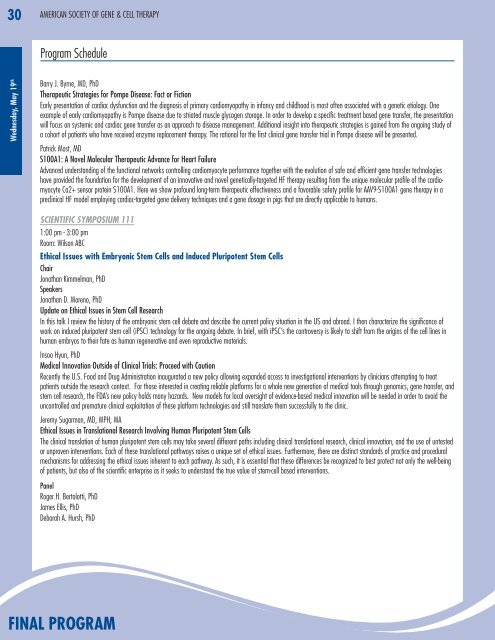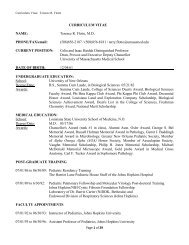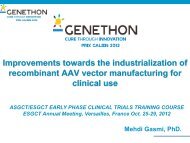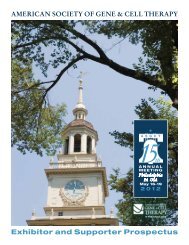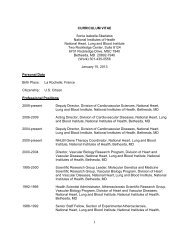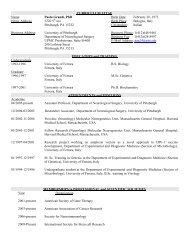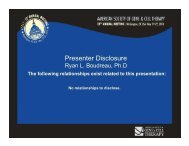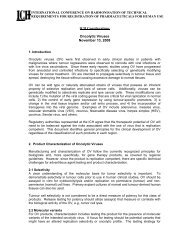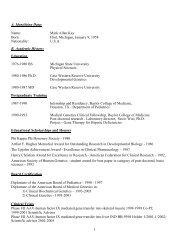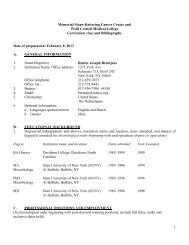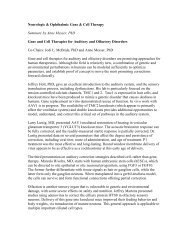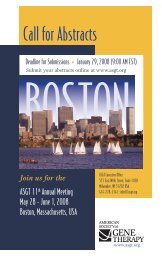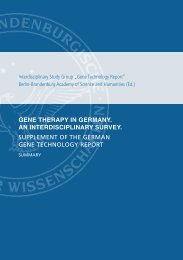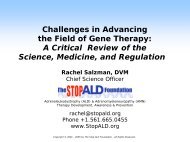FINAL PROGRAM - American Society of Gene & Cell Therapy
FINAL PROGRAM - American Society of Gene & Cell Therapy
FINAL PROGRAM - American Society of Gene & Cell Therapy
- No tags were found...
Create successful ePaper yourself
Turn your PDF publications into a flip-book with our unique Google optimized e-Paper software.
30<strong>American</strong> <strong>Society</strong> <strong>of</strong> <strong>Gene</strong> & <strong>Cell</strong> <strong>Therapy</strong>Program ScheduleWednesday, May 19 thBarry J. Byrne, MD, PhDTherapeutic Strategies for Pompe Disease: Fact or FictionEarly presentation <strong>of</strong> cardiac dysfunction and the diagnosis <strong>of</strong> primary cardiomyopathy in infancy and childhood is most <strong>of</strong>ten associated with a genetic etiology. Oneexample <strong>of</strong> early cardiomyopathy is Pompe disease due to striated muscle glycogen storage. In order to develop a specific treatment based gene transfer, the presentationwill focus on systemic and cardiac gene transfer as an approach to disease management. Additional insight into therapeutic strategies is gained from the ongoing study <strong>of</strong>a cohort <strong>of</strong> patients who have received enzyme replacement therapy. The rational for the first clinical gene transfer trial in Pompe disease will be presented.Patrick Most, MDS100A1: A Novel Molecular Therapeutic Advance for Heart FailureAdvanced understanding <strong>of</strong> the functional networks controlling cardiomyocyte performance together with the evolution <strong>of</strong> safe and efficient gene transfer technologieshave provided the foundation for the development <strong>of</strong> an innovative and novel genetically-targeted HF therapy resulting from the unique molecular pr<strong>of</strong>ile <strong>of</strong> the cardiomyocyteCa2+ sensor protein S100A1. Here we show pr<strong>of</strong>ound long-term therapeutic effectiveness and a favorable safety pr<strong>of</strong>ile for AAV9-S100A1 gene therapy in apreclinical HF model employing cardiac-targeted gene delivery techniques and a gene dosage in pigs that are directly applicable to humans.Scientific Symposium 1111:00 pm - 3:00 pmRoom: Wilson ABCEthical Issues with Embryonic Stem <strong>Cell</strong>s and Induced Pluripotent Stem <strong>Cell</strong>sChairJonathan Kimmelman, PhDSpeakersJonathan D. Moreno, PhDUpdate on Ethical Issues in Stem <strong>Cell</strong> ResearchIn this talk I review the history <strong>of</strong> the embryonic stem cell debate and describe the current policy situation in the US and abroad. I then characterize the significance <strong>of</strong>work on induced pluripotent stem cell (iPSC) technology for the ongoing debate. In brief, with iPSC’s the controversy is likely to shift from the origins <strong>of</strong> the cell lines inhuman embryos to their fate as human regenerative and even reproductive materials.Insoo Hyun, PhDMedical Innovation Outside <strong>of</strong> Clinical Trials: Proceed with CautionRecently the U.S. Food and Drug Administration inaugurated a new policy allowing expanded access to investigational interventions by clinicians attempting to treatpatients outside the research context. For those interested in creating reliable platforms for a whole new generation <strong>of</strong> medical tools through genomics, gene transfer, andstem cell research, the FDA’s new policy holds many hazards. New models for local oversight <strong>of</strong> evidence-based medical innovation will be needed in order to avoid theuncontrolled and premature clinical exploitation <strong>of</strong> these platform technologies and still translate them successfully to the clinic.Jeremy Sugarman, MD, MPH, MAEthical Issues in Translational Research Involving Human Pluripotent Stem <strong>Cell</strong>sThe clinical translation <strong>of</strong> human pluripotent stem cells may take several different paths including clinical translational research, clinical innovation, and the use <strong>of</strong> untestedor unproven interventions. Each <strong>of</strong> these translational pathways raises a unique set <strong>of</strong> ethical issues. Furthermore, there are distinct standards <strong>of</strong> practice and proceduralmechanisms for addressing the ethical issues inherent to each pathway. As such, it is essential that these differences be recognized to best protect not only the well-being<strong>of</strong> patients, but also <strong>of</strong> the scientific enterprise as it seeks to understand the true value <strong>of</strong> stem-cell based interventions.PanelRoger H. Bertolotti, PhDJames Ellis, PhDDeborah A. Hursh, PhDEXHIBITOR PROSPECTUSfinal program


